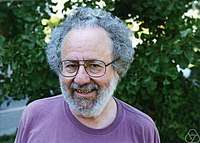Martin Davis
| Martin Davis | |
|---|---|
 | |
| Born |
March 8, 1928 New York City |
| Nationality | American |
| Alma mater | Princeton University |
| Known for |
Davis–Putnam algorithm DPLL algorithm work on Hilbert's tenth problem |
| Awards | Chauvenet Prize (1975) |
| Scientific career | |
| Institutions | New York University |
| Thesis | On the Theory of Recursive Unsolvability (1950) |
| Doctoral advisor | Alonzo Church |
| Doctoral students | Moshe Koppel, Donald W. Loveland |
Martin David Davis (born March 8, 1928) is an American mathematician, known for his work on Hilbert's tenth problem.[1][2]
Biography
Davis's parents were Jewish immigrants to the US from Łódź, Poland, and married after they met again in New York City. Davis grew up in the Bronx, where his parents encouraged him to obtain a full education.[1][2]
He received his Ph.D. from Princeton University in 1950, where his advisor was Alonzo Church.[1][2][3] He is Professor Emeritus at New York University.
Contributions
Davis is the co-inventor of the Davis–Putnam algorithm and the DPLL algorithms. He is also known for his model of Post–Turing machines, and his work on Hilbert's tenth problem leading to the MRDP theorem.
Awards and honors
In 1975, Davis won the Leroy P. Steele Prize, the Chauvenet Prize (with Reuben Hersh), and in 1974 the Lester R. Ford Award for his expository writing related to his work on Hilbert's tenth problem.[2][4] He became a fellow of the American Academy of Arts and Sciences in 1982,[2] and in 2012, he was selected as one of the inaugural fellows of the American Mathematical Society.[5]
Selected publications
- Books
- Davis, Martin (1977). Applied nonstandard analysis. New York: Wiley. ISBN 9780471198970.
- Davis, Martin; Weyuker, Elaine J.; Sigal, Ron (1994). Computability, complexity, and languages: fundamentals of theoretical computer science (2nd ed.). Boston: Academic Press, Harcourt, Brace. ISBN 9780122063824.
- Davis, Martin (2000). Engines of logic: mathematicians and the origin of the computer. New York: Norton. ISBN 9780393322293.
- Articles
- Davis, Martin (1995), "Is mathematical insight algorithmic", Behavioral and Brain Sciences, 13(4), 659–60.
See also
References
- 1 2 3 Jackson, Allyn (September 2007), "Interview with Martin Davis" (PDF), Notices of the American Mathematical Society, Providence, RI: American Mathematical Society (published May 2008), 55 (5), pp. 560–571, ISSN 0002-9920, OCLC 1480366 .
- 1 2 3 4 5 O'Connor, John J.; Robertson, Edmund F., "Martin Davis", MacTutor History of Mathematics archive, University of St Andrews .
- ↑ Martin Davis at the Mathematics Genealogy Project
- ↑ Davis, Martin (1973). "Hilbert's tenth problem is unsolvable". Amer. Math. Monthly. 80: 233–269. doi:10.2307/2318447.
- ↑ List of Fellows of the American Mathematical Society, retrieved 2014-03-17.
External links
| Wikimedia Commons has media related to Martin Davis. |